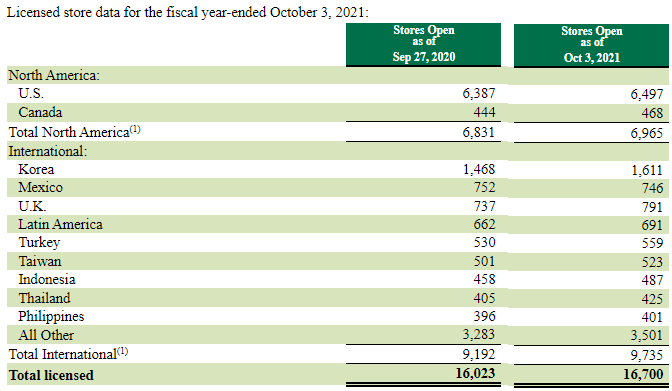Starbucks between shortage and supply of coffee

During fiscal year 2021 (concluded at the end of last October, Starbucks began to experience some shortages of coffee and other supplies.
It also faced transportation delays largely attributable to the impacts of the Covid-19 pandemic, as well as changes in demand and customer behavior.
While the company expects these shortages and delays to continue into fiscal 2022, it considers them temporary and does not believe they will have a material impact on its long-term growth and profitability.

At the same time, to help ensure the future supply of high-quality green coffee and strengthen its leadership role in the coffee industry, Starbucks operates 10 Farmer Support Centers, including its China Farmer Support Center located at Yunnan province.
Starbucks
According to the company, the farmer support centers have agronomists and sustainability experts who work with coffee communities to promote best practices in coffee production designed to improve both the quality and yield of coffee and support the agronomy to address climate change and other impacts.
In addition to coffee, Starbucks also purchases significant quantities of dairy and plant-based dairy-free alternatives, particularly fluid milk, oat milk, and almond milk, to meet the needs of its company-operated stores.
Based on relationships established with its dairy and plant-based dairy-free suppliers, Starbucks anticipates that the risk of not delivering enough fluid milk and plant-based dairy-free alternatives to support its stores is generally remote.
To help ensure compliance with its coffee standards, the company generally controls substantially all of the purchasing, roasting and packaging of coffee and the global distribution of the coffee used in its operations.
Nestlé controls the distribution of certain finished products through the Global Coffee Alliance.
Profile
Starbucks purchases green coffee beans from multiple coffee-growing regions around the world and roasts those beans to its standards for its blends and single origin coffees.
The price of coffee is subject to significant volatility. Although most coffee is traded on the commodity market, high-altitude arabica coffee of the quality that Starbucks seeks tends to trade at a premium higher than the price of the basic «C» coffee product.
Both the premium and the price of the merchandise depend on supply and demand at the time of purchase.
Starbucks is the world’s leading specialty coffee roaster, marketer and retailer, operating in 84 markets.
In addition to its flagship Starbucks coffee brand, it sells products and services under the following brands: Teavana, Seattle’s Best Coffee, Evolution Fresh, Ethos, Starbucks Reserve and Princi.
![]()

